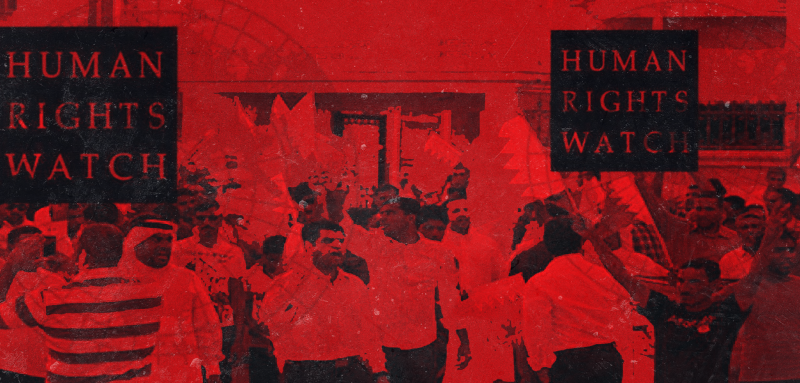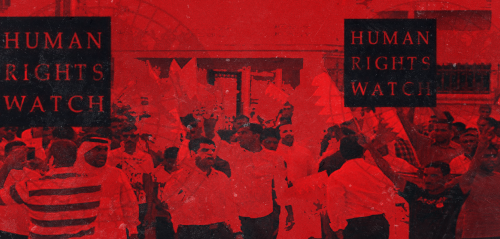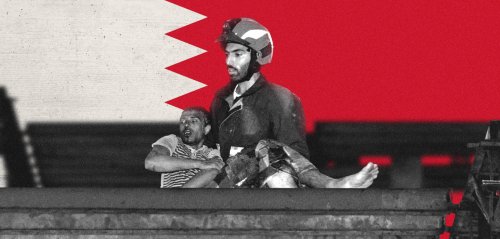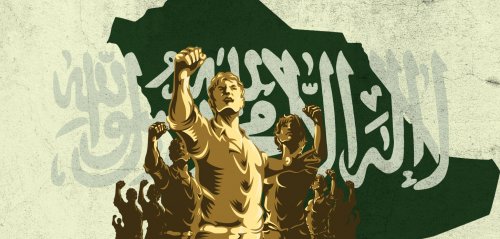Human Rights Watch International accused the Bahraini regime on Monday, October 31st of "banning and isolating the opposition politically", and even of denying it participation in various aspects of "political, civil, and economic life" through "political isolation laws and a series of other tactics" that keep political opponents completely out of public life.
In the 38-page report entitled, "You Can't Call Bahrain A Democracy: Bahrain's Political Isolation Laws", the organization recounts how Bahraini authorities used the 2018 political isolation laws to prevent political opponents from reaching parliament and the boards of directors of civic organizations, revealing other human rights violations that resulted from the government's targeted and "deliberate marginalization of opposition figures."
The report denounces how, "in recent years Bahraini authorities’ marginalization of any political opposition has expanded into new spheres, utilizing a sophisticated, legal regime aiming to strangle what remains of Bahrain’s vibrant, independent civil society." It went on to warn of the "long-term impacts of these exclusionary practices on the health and vitality of Bahrain’s political and civil spheres."
Features of the policies excluding the opposition
Following the peaceful pro-democracy and anti-government uprising in 2011, the authorities in Bahrain took a series of repressive measures against any anti-government movement. Most notably, Bahrain's judiciary dissolved the country's two main opposition parties — the National Islamic Society (al-Wefaq) and the National Democratic Action Society (Wa'ad) — in 2016 and 2017, respectively.
Warning of the "long-term impacts of these exclusionary practices on the health of Bahrain’s political and civil spheres", HRW accuses the #Bahrain government of banning political opponents and denying them participation in all aspects of public life
The following year, political isolation laws introduced additional punitive consequences and criminal penalties against members of these two parties permanently, in addition to activists and human rights defenders arrested "in the government’s large-scale crackdown during, and in the aftermath of the peaceful 2011 pro-democracy and anti-government uprising".
Speaking on the impact of these laws on the political landscape in the gulf kingdom, a leading member of Bahrain's civil society told Human Rights Watch that it is a "very obvious and clear declaration of the non-democratic country that Bahrain has turned into. It is impossible for Bahrain to be called a democracy.”
Joey Shea, Middle East and North Africa researcher at Human Rights Watch, said, "Bahrain has spent the last decade cracking down on peaceful opposition. Political isolation laws are yet another example of the government's repression expanding into new spheres. These draconian laws have made a mockery of Bahrain’s upcoming parliamentary ‘elections,’ which can neither be free nor fair when you make any political opposition essentially illegal.”
In the first parliamentary elections after the political isolation laws came into effect in November 2018, Bahrain's Ministry of Justice banned at least 12 former opposition figures from running, aside from those who decided to boycott the elections.
Prominent civil society groups, including the "Bahrain Human Rights Society", the "Bahrain Women's Union", which includes 13 women's rights groups, and the "Bahraini Society for Resisting Normalization", are struggling to carry on with their activities due to the impact of the political isolation laws.
Another method of exclusion used by the Bahraini authorities against the opposition is obstructing the formation of the boards of directors of the three civil society organizations. The Ministry of Labor and Social Development has the right to suspend access to the organization's bank accounts and sources of funding if the formation of the board of directors is delayed for two years, forcing the association to stop work.
One of the difficulties in forming new boards of directors of civic society groups is that the majority of potential members were either members of Wa'ad or al-Wefaq, and thus cannot be candidates. Also, the existence of vacancies on the boards of directors allows the Ministry of Labour and Social Development to appoint new members, causing fears of too many "government loyalists" on the boards.
"Good Conduct Certificates" are also a form of the economic sanctions used against opposition figures in Bahrain. The certificate, issued by the General Directorate of Crime Detection and Forensic Evidence at the Ministry of Interior, is one of the conditions for getting a job, attending university, or even joining a sports or social club, for all Bahraini citizens and residents alike.
Former political prisoners may wait months or years for this certificate, while some opposition figures are completely deprived of it, to the detriment of their ability to support themselves and their families.
In #Bahrain, due to "the ongoing political arrests from 2011 to 2017, fear has become part of people's daily lives. It's become normal for people to censor themselves and silence themselves before they react"
A member of Bahrain's civil society told Human Rights Watch, "A friend wanted me to become the head of the school, but the ministry refused the certificate so I could not work. The ministry told the owner of the school that they couldn't accept me because I was a member of a political society."
On January 15, 2020, the Ministry of Labour and Social Development circulated a letter to civil society organizations stating that "all candidates for their boards of directors will be subject to security checks."
Bahraini citizens have also been continuously detained and summoned on speech-related charges. A former Bahraini journalist commented that because of the “continuous arrests since 2011 until 2017, fear became part of what people experience on a daily basis. It became normal for people to censor themselves and silence themselves before they react.”
A Bahraini freedom of expression expert also warned in a statement to Human Rights Watch that “there were so many cases of harsh sentences, which indicated that there was an intention to shut up the people, a need to make them afraid.”
"Good Conduct Certificates" are another form of economic sanctions used against opposition figures in Bahrain. While political prisoners may wait years to get it, some opposition figures are completely deprived of it, affecting their ability to support their families
An urgent need to repeal political isolation laws
At the conclusion of its report, Human Rights Watch urged the Bahraini government to repeal its 2018 political isolation laws, restore full political, civil, and legal rights to political dissidents and all Bahraini citizens, and end the practice of denying certificates of good conduct as a punishment for dissidents.
It also appealed to the state to reinstate the political societies it had previously dissolved, lift all restrictions imposed on the opposition in relation to running in parliamentary and municipal elections, end restrictive measures that harm the basic functioning of civil associations, and release anyone imprisoned solely for peaceful political activism.
Another appeal was made by the human rights organization to countries that are allied and close to the regime in Bahrain — including the United States, the United Kingdom, European Union states, and Saudi Arabia — to exert pressure on the Bahraini authorities, by stopping arms sales and security, commercial, and other cooperation, in order to "end its repression of peaceful opposition and civil society, and reject the results of what will be unfree and unfair parliamentary elections in November if they do not."
Joey Shea concluded by saying, "Bahrain's once-vibrant civil society and opposition coalition are being wiped out by laws codifying the government's repression. No one should be under any illusion that Bahrain’s ‘democratic institutions’ are anything more than a sham.”
Raseef22 is a not for profit entity. Our focus is on quality journalism. Every contribution to the NasRaseef membership goes directly towards journalism production. We stand independent, not accepting corporate sponsorships, sponsored content or political funding.
Support our mission to keep Raseef22 available to all readers by clicking here!
Interested in writing with us? Check our pitch process here!







Join the Conversation
ذوالفقار عباس -
1 hour agoا
Hossam Sami -
2 hours agoصعود "أحزاب اليمين" نتيجة طبيعية جداً لرفض البعض; وعددهم ليس بالقليل أبداً. لفكرة الإندماج بل...
Anonymous user -
1 day agoرائع و عظيم ..
جيسيكا ملو فالنتاين -
5 days agoزاوية الموضوع لطيفة وتستحق التفكير إلا أنك حجبت عن المرأة أدوارا مهمة تلعبها في العائلة والمجتمع...
Bosaina Sharba -
1 week agoحلو الAudio
شكرا لالكن
رومان حداد -
1 week agoالتحليل عميق، رغم بساطته، شفاف كروح وممتلء كعقل، سأشاهد الفيلم ولكن ما أخشاه أن يكون التحليل أعمق...